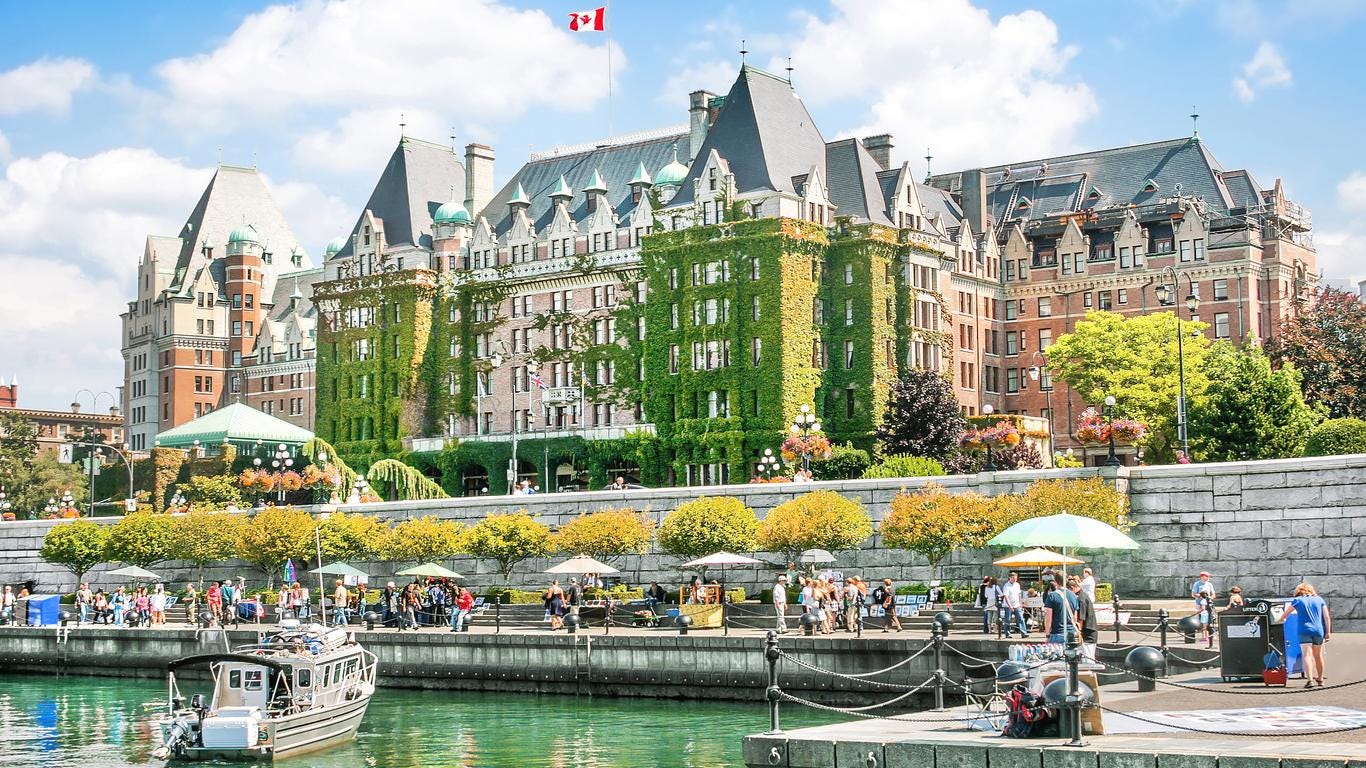The Unbearable Expectation of Assimilation
One man's oasis can be another’s ghetto
“Put an ocean and river between everybody else. Between everything, yourself and home” - The National, England
I’ve spent most of my life as a migrant, in places I wasn't from and didn't belong. All of these places have been Western, and with one exception, English-speaking nations where the differences were slight but large enough for everyone to notice. The odd thing about culture clashes is that the smaller the distance between the host culture and the newcomer, the more obvious the discrepancy can become to those attempting to fit in. Whereas an individual from a completely different culture, perhaps also with a different dominant language and religion, can cut themself away and exist in a bubble of their own creation, those who can't help but exist within the fringe are doomed to a strange sort of (dare I say it) “microaggressive” culture clash, little differences and inconveniences which pile up and potentiate upon each other. The English writer Dodie Smith once said, “Americans do seem to say things which make the English notice England.” What’s left unsaid is how little both parties care for this.
From my experience, total assimilation is impossible. Functional assimilation, that of learning the language, contributing to society both economically and socially, and operating in a relatively frictionless day-to-day experience is perfectly achievable, though at differing degrees of difficulty depending on the host country and the native culture of the aspiring assimilator. But while a Canadian can fit into Britain almost instantaneously, it is not the case that Britishness can fit into a Canadian. The differences are slight, but the 90/10 rule holds for cultures as it does for companies: “90% of the work gets done in 10% of the time and 10% of the work takes 90% of the time.” Like learning a new language, as you approach total assimilated cultural fluency, every new step becomes exponentially more difficult and significantly less rewarding. What does it matter if I say pants instead of trousers so long as I pay my taxes? But it does matter, more than anyone on either side feels comfortable admitting. It is these final points that will permanently separate the foreigner, in small, hard-to-define ways, from being a member of their new nation’s “us,” rather than a “them.” At best the immigrant can reconcile themselves with being “one of the good ones,” but there will still remain a great deal of difference in appreciating the beautiful history of a cultural marvel such as a cathedral or Cenotaph and thinking “that was here” and “that was us.”
There is another phenomenon that works against imported individuals, their very presence causes the discussion of differences to jump to the front of the conversation. I have never felt more Canadian than when I was living away from Canada, and this feeling begets more “Canadian-like” behaviors to make a reappearance, to justify themselves and provide contrast in a self-justifying sort of way. Those contrasted against also become more of a pastiche of their cultural heritage as well, embodying stereotypes to show support for something they can never fully articulate, but are completely a part of, in a way that they were not before they encounter a novelty who doesn't have the same heritage, home, references, and cultural resonance that they take for granted. How can I truly assimilate when new cultures do not suppress my Canadian-ness, but magnify it?
This is the relentless struggle of the assimilator, you force those whose home you inhabit to take stock of what they have never had to notice before, then realize how different they actually are from you, a revelation you were both hoping to keep private. What no one will admit to, is that this breeds a small, quiet resentment from both parties. Those who can't manage a perfect fit vs those who are perfectly fit, and are now troubled by the understanding of just how ensconced they are. I, as an immigrant to somewhat companion cultures that relegate me perpetually on the fringe, can only imagine one thing worse, those who know that they will never fit, not perfectly, not partially, not at all. That doesn't breed a low, harmless hostility, one that provides fun little battles over stereotypes and can be smoothed over with a beer. That feeling, of total foreignness, that of the alien, can give rise to a total rejection.
As the saying goes, “What do they know of England, who only England know?” As England shrinks, those who only know of England will see the world, whether they want to or not, firsthand knowledge of all its delicacies and disturbances in our new age of discovery. The world has come to England - its ancient feuds and modern-day disturbances made manifest on streets from Leicester to London. The assumption that the World would want to know England once it got here seems strange, as it was never really the case - in the first age of discovery, the ships only ever went one way. So, are these battles for heritage, or are they a form of homesickness - a cultural graft rejection, just in reverse? When an organ transplant fails, it's due to the body's immune system rejecting the new tissue, attacking what it correctly recognizes as foreign. In order to mitigate this, donor and recipient must be matched by their similar antigens so that the body does not fight off its newest addition and immunosuppressants must be prescribed to lower the chance of rejection. These suppressants also have a nasty side-effect of exposing the body to new ailments it could have previously fought off unaided. The whole system must be controlled as the suppressants cannot target only one part. With cultures, this metaphor breaks both ways, the transplant can strike back, and first, if it wants to, should it find its new host's suppressed cultural antigens mismatched on its own terms.
This is the dynamic of cultural refutation, now seen not only in England but across the West, as a result of a new war in the Middle East. Are the protests that have dominated London the past few weeks pro-peace, pro-Palestine, or are they anti-Israel? Better question: are these protests against the very aspiration of assimilation? Reverse rejection, an outlet for the anger of realizing just how unbearable the expectation of fully assimilating really is? It’s hard to believe anyone can come to England without noticing its quiet, simple beauty. Love it, hate it, desire it, or deject it, this country remains unignorable. But unignorable is not the same as unlikeable, beauty is often destroyed as it can't help but stand in silent judgment. When the BBC reports that one can live their entire life in ethnic enclaves inside England without speaking English, and when underground poems sprout up about reverse colonization, everyone can recognize this as the symptoms of a failed graft. All that is left to fight over is whose fault it is.
The left blames the hosts. The right blames the newcomers. Neither side has taken the proper dosage of cultural immunosuppressants. I’ve lived in too many places to fall comfortably with either tribe. England and its Englanders are some of the most welcoming people on the planet, but they can't help being authentically themselves, fully inhabiting the country and culture that belongs to them. They don't have the option of saying they are proud to be an immigrant, they are not, they are home. But they don't have the option of being proud of that either, it's been suppressed in the hopes of a successful transplant. This suppression always seems a bit punitive as well, as if it's their fault that true assimilation is an unassailable challenge they consciously foster upon others, rather than understanding that true assimilation is unassailable everywhere. Still, it's hard for me to judge, say, Romanian immigrants who have come to England and formed their own Romanian enclave where they speak Romanian, act Romanian, and live with other Romanians. If I were to move to Romania and had the option to live in a Canada-Town where I could speak English while living and working with minimal culture shock among my fellow expats, I might try to avoid the temptation (and probably shamefully fail). However, farther out of past the fringe of the West, in a country where no one acted, looked, or spoke like me, Canada-Town would be a blessing. Unfortunately, one man's oasis can be another’s ghetto.
On a recent Triggernometry episode, Bill Maher, referencing a recent Substack by Andrew Sullivan, noted that “London went from 36% to 86% people of color… Okay, that's progress. I’m not a bad person to, like, clap for progress.” Sullivan also quotes a friend in his essay who says, “I cannot tell you how happy it makes me that I can go around London and never hear English spoken!” Both these statements will bristle those on the right, but few care to notice how they clash against each other. Is Maher’s progress a country where less and less people speak the language, unable or unwilling to assimilate? This is not the progress the British have voted for, exercising their liberal and democratic values only to be ignored.
Maher is not English, but Douglas Murray is. Touching on the same topic, on the same show, Murray said recently, “Oh, but might it be against our liberal values… I’m not as interested in that as I am in Britain remaining Britain.” The “it” Murray is referencing is combatting Maher’s progress, progress which has led to excellent foreign food, a symphony of new languages, and Palestinian protests that include statements like “Hitler knew how to deal with these people,” and “Muslim armies isn't it time?” These protestors obviously agree with Ghandi when he said that “Palestine belongs to the Arabs…” but it's harder to discern if they agree with the back half of his statement, “...in the same sense that England belongs to the English or France to the French.”
Should this relentless train of progress reach its final destination, that final abolition, I have to imagine all those who make it to the final stop will hesitate before departing. Even they, distant and despondent, will know something has been forever lost. I’m thankful that day will never come though, as I am very confident there will always be an England. Whether this comes at the cost of our liberal values or not will mean a new conversation about the limits and desirability of assimilation must be had, soon and seriously. The old assumptions about integration and immunosuppression will have to be revisited and revised. Transplant rejections don't automatically kill the host, but organ failure is never pretty.




According to the person whose link led me to your Substack, you are from "the Island" and, if so, you are perhaps amused and slightly dismayed by the recent protests of migrants; "student visa" holders who seek to leverage the sympathies of the locals but inevitably turn to accusations of racism when questioned about their intentions.